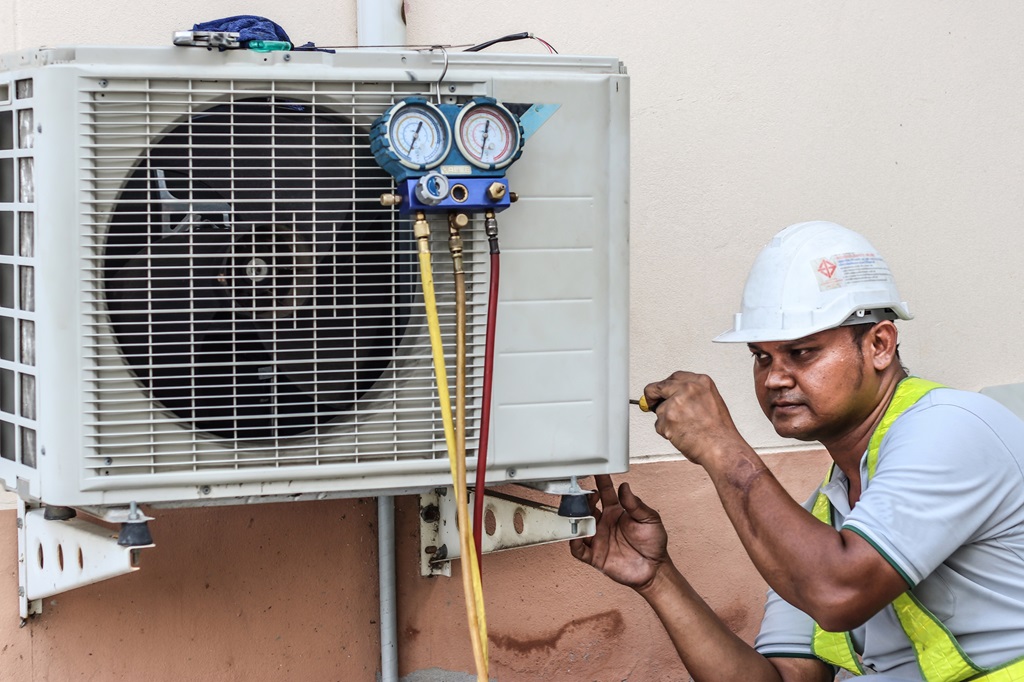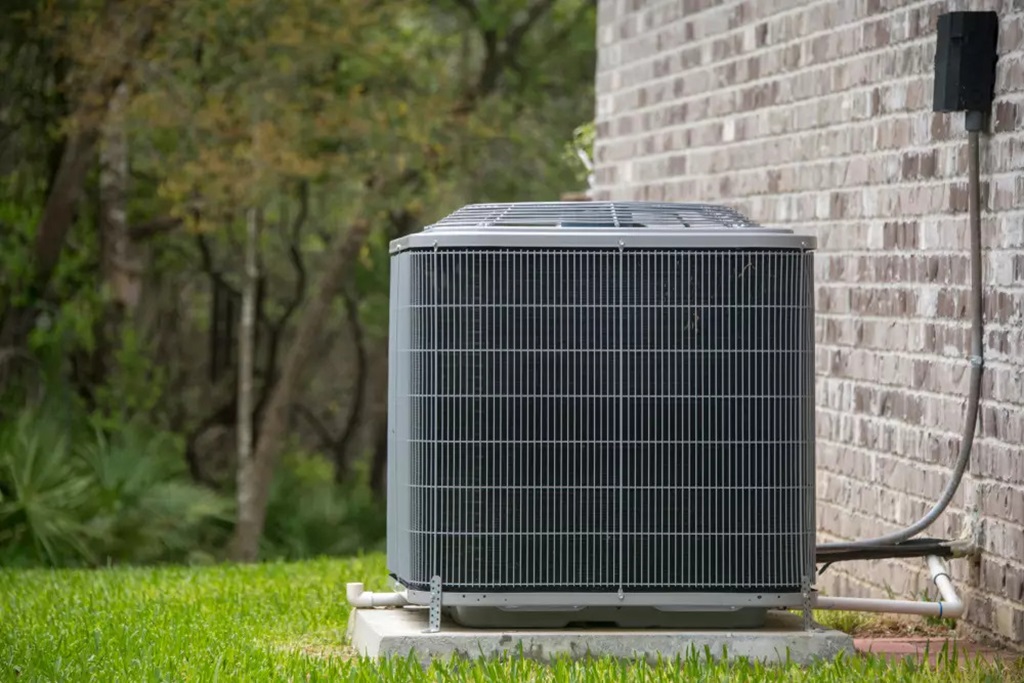Your air conditioner is humming along, keeping the summer swelter at bay, when suddenly… it’s not. The air feels lukewarm, the unit is making strange noises, and a sense of dread washes over you. Is it a refrigerant leak? Before you panic, let’s dive into the world of refrigerant troubleshooting, armed with knowledge and a cool head.
This comprehensive guide will equip you with a detailed troubleshooting chart, walk you through frequently asked questions, and empower you to understand your AC system better. While some issues may require a licensed professional, having this information can help you identify the problem, communicate effectively with technicians, and potentially save on costly repairs.
Understanding Refrigerant and its Role
Refrigerant is the lifeblood of your air conditioning system. This specialized fluid absorbs heat from indoor air and releases it outside, facilitating the cooling process. Think of it as a tireless worker, continuously cycling between liquid and gaseous states to keep your home comfortable.
However, refrigerant is not something you “top up” like fuel in a car. A properly functioning system should have a sealed amount of refrigerant that lasts for the lifetime of the unit. If your AC is low on refrigerant, it almost always indicates a leak, which needs to be addressed by a qualified technician.
Refrigerant Troubleshooting Chart
This chart outlines common symptoms associated with refrigerant problems, possible causes, and potential solutions. Remember, safety first! Always turn off the power to your AC unit at the breaker box before performing any inspection or troubleshooting.
Related: What is a portable heat pump?
| Symptom | Possible Cause | Solution |
| Insufficient Cooling | Refrigerant leak | Contact a technician to locate and repair the leak, then recharge the system. |
| Dirty air filter | Replace or clean the air filter. | |
| Blocked air vents | Ensure vents are open and unobstructed. | |
| Thermostat malfunction | Check thermostat settings and batteries; consider replacing if faulty. | |
| Warm air blowing from vents | Low refrigerant levels | Contact a technician to locate and repair the leak, then recharge the system. |
| Compressor failure | Contact a technician to diagnose and potentially replace the compressor. | |
| Frozen evaporator coil | Turn off the AC and allow the coil to thaw; contact a technician to address underlying causes like airflow restrictions. | |
| Hissing or bubbling sounds | Refrigerant leak | Contact a technician to locate and repair the leak, then recharge the system. |
| Ice formation on refrigerant lines | Low refrigerant levels | Contact a technician to locate and repair the leak, then recharge the system. |
| Restricted refrigerant flow | Contact a technician to inspect and clean the refrigerant lines. | |
| Increased energy bills | The system working harder due to low refrigerant | Contact a technician to locate and repair the leak, then recharge the system. |
| Inefficient AC unit | Consider upgrading to a more energy-efficient model. |
Export to Sheets
Refrigerant Troubleshooting: FAQs

-
How do I know if my AC has a refrigerant leak?
While a definitive diagnosis requires professional expertise, some telltale signs include:
- Poor cooling: Your AC struggles to cool your home effectively, even at the lowest thermostat setting.
- Warm air from vents: Instead of cool air, you feel warm air blowing from the vents.
- Hissing or bubbling sounds: These noises can indicate refrigerant escaping from the system.
- Ice formation: Ice on refrigerant lines or the evaporator coil can be a sign of a leak.
- Increased energy bills: Your AC system has to work harder to compensate for the refrigerant loss, resulting in higher energy consumption.
-
What causes refrigerant leaks?
Refrigerant leaks can stem from various factors, including:
- Corrosion: Over time, refrigerant lines can corrode, leading to leaks.
- Vibration: Constant vibration from the AC unit can weaken connections and cause leaks.
- Manufacturing defects: In some cases, leaks can be attributed to faulty manufacturing.
- Improper installation: Incorrect installation can damage refrigerant lines or create loose connections.
- Age: Older AC units are more prone to leaks due to wear and tear.
-
Can I add refrigerant myself?
While DIY refrigerant recharge kits are available, it’s strongly recommended to avoid handling refrigerant yourself.
Refrigerant is a hazardous substance, and improper handling can lead to:
- Environmental damage: Refrigerants are potent greenhouse gases that contribute to climate change.
- Health risks: Direct contact with refrigerants can cause skin irritation, frostbite, and respiratory problems.
- Legal issues: In many jurisdictions, handling refrigerants without proper certification is illegal.
-
How do technicians find and repair refrigerant leaks?
HVAC technicians use specialized tools and techniques to detect and repair leaks:
- Electronic leak detectors: These sensitive devices can pinpoint even the smallest leaks.
- Ultraviolet dye: A special dye is added to the refrigerant, allowing technicians to trace leaks using a UV lamp.
- Pressure testing: The system is pressurized to identify areas where pressure drops, indicating a leak.
- Repair methods: Depending on the location and severity of the leak, technicians may use soldering, brazing, or specialized sealants to repair it.
-
How often should I check my AC for refrigerant leaks?
It’s generally recommended to have your AC system inspected and maintained by a qualified technician at least once a year, preferably before the cooling season starts. This proactive approach can help identify potential problems early on, preventing costly repairs and ensuring optimal performance.
-
Can a refrigerant leak be prevented?
While it’s impossible to eliminate the risk of leaks entirely, regular maintenance can significantly reduce the likelihood:
- Annual inspections: Schedule professional inspections to catch potential issues early.
- Clean air filters: Dirty air filters can restrict airflow, putting extra strain on the system.
- Coil cleaning: Keep the evaporator and condenser coils clean to ensure efficient heat transfer.
- Protect outdoor unit: Trim surrounding vegetation and keep the area around the outdoor unit clear of debris.
-
What are the signs of a refrigerant overcharge?
Overcharging the system with refrigerant can be just as detrimental as a leak. Signs of overcharging include:
- Reduced cooling efficiency: The system struggles to cool effectively.
- High head pressure: This can strain the compressor and lead to premature failure.
- Liquid refrigerant entering the compressor: This can cause significant damage to the compressor.
-
What are the different types of refrigerants?
Over the years, different types of refrigerants have been used in AC systems. Some common ones include:
- R-22 (Freon): An older refrigerant that is being phased out due to its ozone-depleting properties.
- R-410A (Puron): A more environmentally friendly refrigerant that is widely used in modern AC systems.
- R-32: A newer refrigerant with even lower environmental impact, gaining popularity in recent years.
-
What should I do if I suspect a refrigerant leak?
If you suspect a refrigerant leak, follow these steps:
- Turn off the AC: Switch off the power to your AC unit at the breaker box.
- Ventilate the area: If you smell a strong, unusual odor, open windows and doors to ventilate the space.
- Contact a qualified technician: Schedule an inspection with a licensed HVAC professional to diagnose and repair the leak.
-
How much does it cost to repair a refrigerant leak?
The cost of repairing a refrigerant leak can vary depending on several factors:
- The severity of the leak: A small leak may be relatively inexpensive to fix, while a major leak requiring extensive repairs can be more costly.
- Type of refrigerant: Older refrigerants like R-22 are becoming more expensive due to their phase-out.
- Accessibility of the leak: Leaks in hard-to-reach areas may require more labor to repair.
- Labor costs: Technician fees can vary depending on your location and the complexity of the repair.
Remember: Addressing refrigerant leaks promptly is crucial not only for your comfort but also for the environment and the longevity of your AC system. By understanding the signs, causes, and solutions, you can take proactive steps to maintain your AC and ensure a cool and comfortable home.





